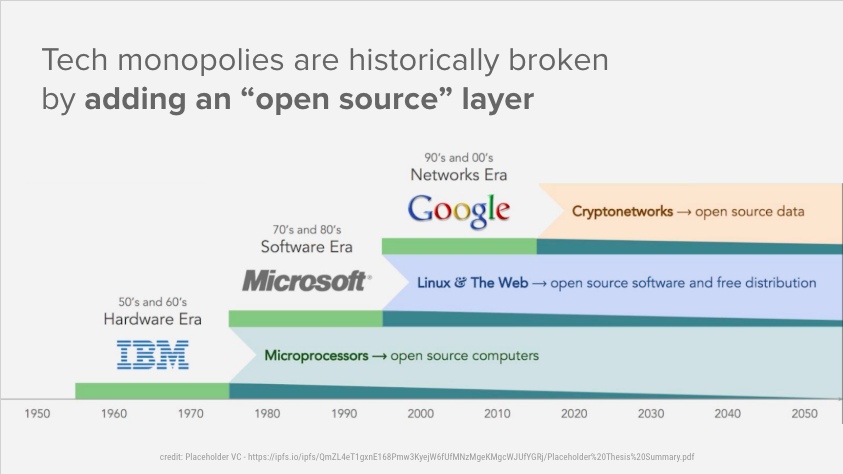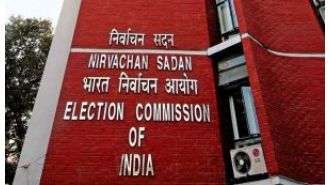Centralization vs Decentralization
Decentralization is one of, if not the most, discussed features of the crypto tech stack. In a decentralized system, no single body controls the system. We have most certainly not reached the era fully decentralized systems, but that is what most of the world-class technologists working in the crypto sector are focused on getting us to and I believe we will get there in the not too distant future.
If you are a student of tech history, you will not be surprised that decentralization is also the right technology arriving at the right time to solve some of the most challenging policy problems facing the tech sector right now.
Before I elaborate on that, I want to show you a slide from my colleague Nick‘s deck on crypto that he uses to talk to policymakers and elected officials. I believe he borrowed it from our friends at Placeholder and they are credited at the bottom of this slide.

Here is my quick explanation of that slide.
IBM had a near monopoly on computing by virtue of their domination of the mainframe, mini-computer, and, it seemed, the PC computing platforms.
But the open PC hardware standard allowed Microsoft to develop an operating system that could run on any computer built to the PC hardware spec and they eventually unseated IBM, only to become a near monopoly themselves.
But just as we were wringing our hands about what to do about Microsoft’s monopoly, an open source operating system (Linux), the internet protocols, and the free distribution of the world wide web undid that monopoly and we got Google, Facebook, Amazon, and other big tech platforms.
And now we are wringing our hands about these near monopolies and their market power and the ability of bad actors to manipulate them. And around the same time, the technology to architect and scale a completely decentralized system emerges.
The other thing that is true of these moments of hand wringing is that just as the technology is emerging to unseat the near monopolies, regulators and elected officials try to put the genie back in the bottle using traditional regulatory techniques that often end up more deeply entrenching these near monopolies.
To give you an example of how this might happen, I am going to suggest you all go read my partner Albert’s post from yesterday on Twitter and how one might approach addressing some of the vexing problems that platform is dealing with right now.
Albert points out that:
On the minus side the calls to treat Twitter as a traditional publisher are growing.
That is how elected officials and regulators often think. They look backwards to find a model of regulation that has worked in the past and try to apply it to a new thing. But as Albert explains:
The idea that there could or should be a single central institution, let alone a commercial company, which as a benevolent dictator resolves all of these issues to everyone’s satisfaction is a complete non-starter.
Instead he proposes a few ideas that are steeped in decentralization:
my preferred go to answer is to shift more power to the network participants by requiring Twitter (and other scaled services) to have an API. That would allow endusers to programmatically create the best version of Twitter and would also make it easier to simultaneously use Twitter and new decentralized alternatives.
And
Twitter should significantly expand the features that let individuals and groups manage the visibility for tweets for themselves. There are already useful features such as muting a conversation or blocking an individual. These could be expanded in ways that allow for delegation. For instance, users should be able to say that they want to subscribe to mute and block lists from other individuals, groups or organizations they trust. One example of this might be that I could choose to automatically block anyone who is blocked by more than x% of the people I follow (where I can choose x). Ideally these features could be implemented at the tweet/conversation level and not just the account level.
So you can see that by decentralizing the power to the edges of the network INSTEAD of further concentrating it by requiring the network owner to further centralize power is the right answer, both from a technology perspective and a regulatory/policy perspective.
Sadly, I think we are in a race with ourselves in this centralization vs decentralization debate. We need the decentralized tech stack to evolve more quickly and show the world how decentralized technology works in a mainstream way at scale before policy makers and regulators force the tech sector to go the wrong way.
And, most disturbingly, the regulators and elected officials are taking actions, well intended of course, to slow the decentralized sector down, not speed it up.
Which is why we at USV have been spending a lot of time with public servants of all kinds, educating them, imploring them, and desperately trying to get them to understand where we are, why it is an important moment, and why we need to this new technology to succeed.






